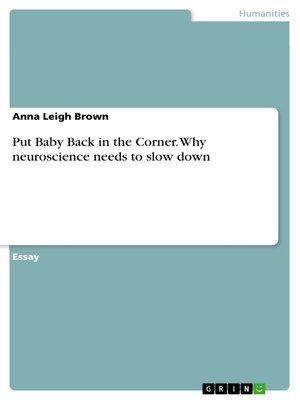
Sign up to save your library
With an OverDrive account, you can save your favorite libraries for at-a-glance information about availability. Find out more about OverDrive accounts.
Find this title in Libby, the library reading app by OverDrive.



Search for a digital library with this title
Title found at these libraries:
| Loading... |
Essay from the year 2013 in the subject Psychology - Methods, Jacobs University Bremen gGmbH, language: English, abstract: 1990-2000 was declared by the US Congress to be the 'Decade of the Brain'. With projects like the Human Brain Project and the American answer of the BRAIN Initiative recently in the news for the millions they received in funding, it appears evident that neuroscience has captured public attention. But those working within the field have begun to notice an alarming new trend. Every other day it appears that there is a new flavor of neuroscience. There is Neuroethology, Neurolinguistics, Paleoneurology, Cultural Neuroscience, Neuroeconomics, and the list goes on. Neuroscience is becoming full of these specialized niches of inquiry. The logic behind these specialties is that since everything comes from the brain, everything can be reduced to a neuroscientific argument eventually. In general, too much specification within in science can be bad. Scientists have the tendency to create categories in the world and put certain phenomena into boxes that are realms of study. Thus, there is chemistry, which is distinct from biology, which is distinct from psychology. It is easy to see that in reality there are no clear lines of what makes a problem a chemical, biological or psychological one and that to truly understand a problem it must be viewed from all levels. However, this fact is easily forgotten and scientists often find themselves trapped looking at a problem only through their personal science's paradigm. This categorization can lead to scientists forgetting the context of a problem which can actually influence and determine the nature of an issue all together (Barrett, Mesquita, & Smith, 2010). But this tendency to essentialism is not the main issue why the number of neurosciences should be constrained. It is impossible to say how many are needed exactly, but at present the number is far too high. Neuroscience is a new science that few people truly understand which makes it easy to abuse and it does not have the tools or ability yet to branch out too far beyond the individual brain.






